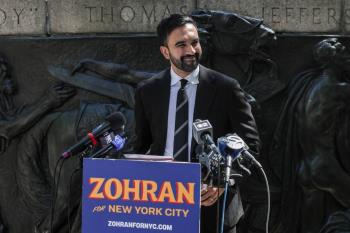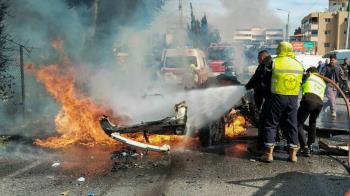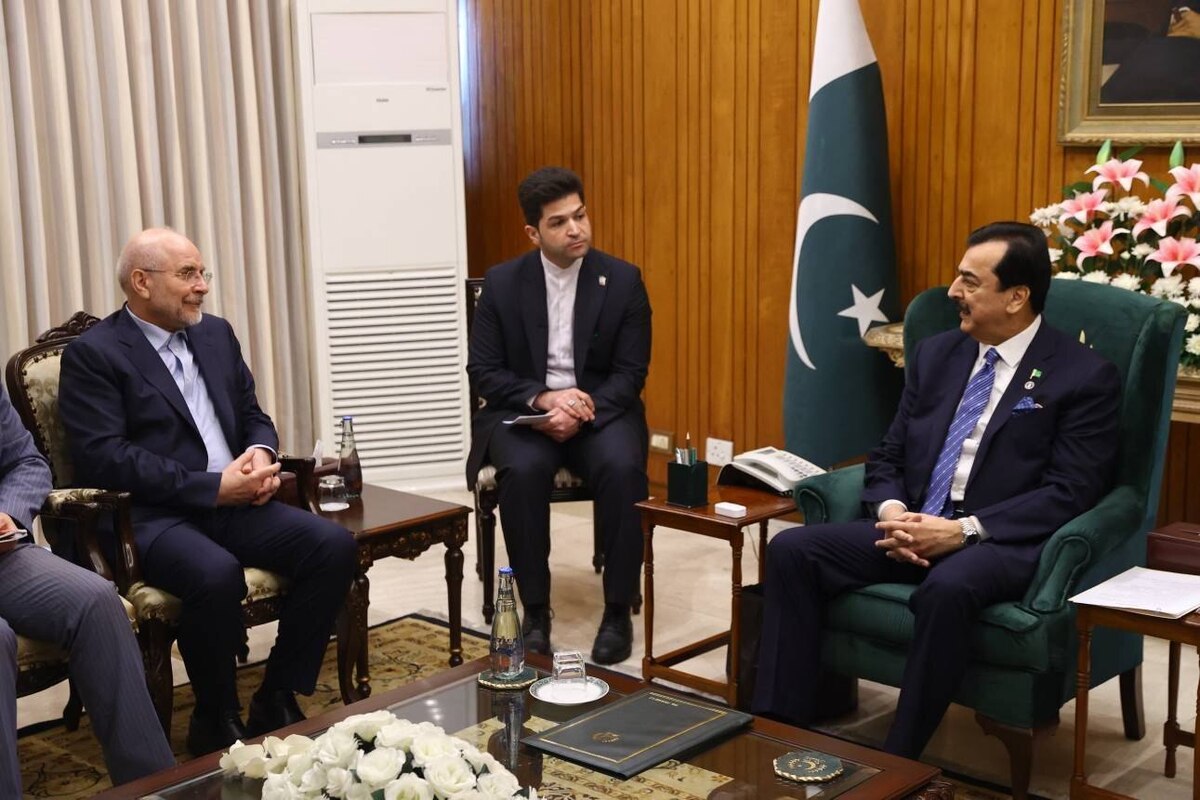Alwaght- Amid fast-moving regional developments, competition, and rise of new alliances in new West Asian geopolitical equations, Iran is developing a multi-layer and inter-institutional diplomacy in its foreign policy. The Iranian parliament, as part of this policy, has been working to offer a complement to the foreign policy by expanding its parliamentary contacts.
In this connection, the visit to Pakistan of the Iranian parliament speaker Mohammad Baqer Ghalibaf can be regarded as a targeted step in a path of deepening economic cooperation and political convergence at a regional level. This visit is not only a logical sequel to the parliament's active diplomacy after Hamas’s Operation Al-Aqsa Storm on Israel October 7, 2023, but also is carrying clear messages of Tehran's will for construction interaction, upgrading trade ties, and boosting strategic bonds with close neighbors. This once again proves that in the period after the nuclear deal and the Western claims about reinstatement of sanctions, not only the door to economic and political cooperation not been closed, but also it began to boost.
Trade and economic objectives
While economic agreements traditionally fall under the purview of governments and executive branches, parliaments are now playing an increasingly pivotal role in shaping policy and ratifying international deals to bolster foreign trade. This shift was evident during Ghalibaf's visit, where significant focus was placed on bilateral economic ties and the parliamentary role in facilitating cooperation. The accompanying parliamentary delegation signals a serious political commitment, underscoring the high-level governmental priority placed on finalizing a free trade agreement and removing barriers.
Official data shows Iran-Pakistan bilateral trade recently surpassed $3 billion. Both nations have now expressed ambition to boost this figure to at least $10 billion annually. A key prerequisite for achieving this target is facilitating a free trade agreement by reducing tariff barriers, which is a key objective for the Iranian delegation in Islamabad.
At the recent ECO summit in Tehran, senior officials from both countries underscored the need for rapid progress on regional trade facilitation through the bloc. Prior to Ghalibaf's trip, Pakistan's ambassador to Tehran, Muhammad Mudassir Tipu, told Tabnak news that regarding the free trade agreement and related infrastructure, "90 percent of the groundwork is already complete."
Why is this aim important?
1. Undiscovered capacities and geographical neighborhood: Iran and Pakistan are geographically and historically close. This is a privilege in terms of logistics and region.
2. Diversity of goods and routes: Pakistan is boosting exports of agricultural products, including rice, meat, and other value-added goods, to Iran. Conversely, Iran is actively leveraging their shared border to access Pakistani markets and secure a transit route for its goods into Central Asia.
3. Using tools like barter trade and free trade agreements: A key focus of the talks is accelerating the signing of a Free Trade Agreement (FTA) between the two nations. The Pakistani ambassador has confirmed that final negotiations for the FTA are now underway. This push has already yielded concrete results, including the recent approval of a new framework for barter trade, designed to streamline and expand commercial exchanges.
4. Geopolitical benefits and regional connections: Iran's pivotal role in the East-West and North-South transit corridors, combined with Pakistan's potential as a gateway to both Central Asia and the Persian Gulf, creates a powerful synergy. By deepening their trade partnership, the two nations can transform their geographic assets into greater strategic influence.
Active parliamentary diplomacy of Iran
Iran’s Parliament Speaker, Mohammad Bagher Ghalibaf, has emerged as a key figure in Tehran’s parliamentary diplomacy in recent months, undertaking a series of high-stakes international visits. In a clear demonstration of support, Ghalibaf traveled to Beirut on October 12, 2024, entering Lebanon amidst severe threats and an Israeli aerial blockade. The high-profile visit broadcast Iran's message of solidarity with the Lebanese government and resistance.
Immediately following his Beirut stop, Ghalibaf headed to Geneva to attend the 149th Assembly of the Inter-Parliamentary Union (IPU), where he worked to internationalize the issues of Palestine and Lebanon.
This activism follows his earlier participation in a meeting of BRICS parliamentary speakers, signaling Iran's intent to actively shape policy within the expanding bloc. Analysts suggest that such parliamentary outreach is particularly effective with nations where legislatures hold central policymaking power, like Pakistan, where its parliament plays a prominent role in legislation and oversight. This parliament-to-parliament channel is seen as a foundation for fostering long-term cooperation.
This form of diplomacy facilitates cultural, social, and commercial ties, operating in parallel to traditional executive and foreign ministry channels to complement a nation's overall foreign policy. A personal visit by Iran's top parliamentarian signals the strategic priority Tehran places on regional relationships. Furthermore, parliamentarians can act as a crucial bridge between the private sector, governments, and markets.
Aims of Pakistan visit
Strengthening parliamentary cooperation between Iran and Pakistan is a central goal of this visit. This focus is strategic, as Pakistan's active National Assembly plays a key role in policymaking and legislation.By focusing on this legislative dimension, both countries can embed cooperation within their law-making bodies, making it more durable. This form of parliamentary diplomacy is often faster, more flexible, and less vulnerable to sanctions or official state-level restrictions, a significant advantage for Iran under current conditions.
In practical terms, enhancing the Iran-Pakistan parliamentary friendship group can speed up agreements on trade, investment, and regional projects. Ultimately, it creates a pathway for regional convergence through direct parliament-to-parliament ties. This channel serves as a crucial complement to traditional diplomacy, especially when high-level executive relations face tension.
Regional aspects and Iran-Pakistan convergence
As competitions intensify between big powers and West Asia takes a center stage in them, Iran and Pakistan can form a "regional aligned group" combining the economic interests with security and political interests. The two neighbors have almost shared stances on several regional cases:
On the issue of Gaza and the defense of the Palestinian cause, both nations maintain their longstanding policy of not recognizing the Israeli regime.
During the 12-day conflict between Iran and Israel, Pakistan adopted assuring positions in support of Tehran. It was among the first countries to strongly condemn the Israeli regime's aggression and even indicated a readiness to provide Iran with military aid. In a recent meeting, Ghalibaf described Islamabad's support as a sign of the profound friendship between the two governments, stating: "Undoubtedly, due to their numerous shared interests, Iran and Pakistan can stand together against the ambitions of the Israeli regime."
On security and transit, the two countries are emphasizing regional connectivity, finalizing transit routes, and facilitating border cooperation. This political alignment is poised to build strategic trust. By expanding cooperation in transit, oil, gas, and trade, they are positioned to act as a vital regional bridge.
Overall, it can be said that Ghalibaf's Islamabad visit goes beyond an official visit. It actually sends a clear message: Tehran wants to enter a new stage of economic cooperation and regional cooperation with an instrument that also takes parliamentary diplomacy seriously. If the talks translate into actions fast and infrastructures are activated, we can see emergence of a strategic economic-political bond between the two countries that is not only in their best interest, but also serves regional stability and development.



























